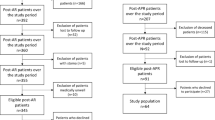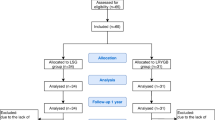Abstract
Purpose
The recovery benefits of laparoscopy are traditionally believed to minimize the initial negative impact of surgery on early postoperative quality of life (QOL). We evaluate whether laparoscopic colectomy leads to recovery of QOL early after surgery and evaluate factors associated with the change in QOL.
Methods
Preoperative and early postoperative QOL data (SF-36) were prospectively accrued for patients undergoing laparoscopic colorectal resection (LCR) (2002–2009). Changes in postoperative QOL from preoperative values and effects of patient, disease, operation and postoperative outcomes on these changes were evaluated.
Results
One hundred and sixty-six patients (female = 86) underwent LCR for cancer (n = 79), Crohn’s disease (n = 24), diverticulitis (n = 38), and ulcerative colitis (n = 25) with complete SF-36 scores. Median age was 56.9 (range: 15–91) years, mean body mass index 27.4 ± 6.2 kg/m2 with American Society of Anesthesiologists (ASA) class being II in 94 patients. Median operative time was 152.5 (range: 50–358) min; mean length of stay (LOS) 4.5 ± 3.3 days. At 4 weeks, the postoperative SF-36 physical component scale (PCS) continued to be lower than the preoperative PCS (41.8 ± 8.8 vs. 47.1 ± 9.4, P < 0.001), while the postoperative SF-36 mental component scale (MCS) was similar to the preoperative MCS (45.6 ± 10.2 vs. 46.1 ± 11.9, P = 0.17). Gender, age, operation, LOS, surgeon, ASA, BMI, complications, and readmission were not associated with a change in QOL from preoperative values. Cancer as an indication for surgery was associated with less improvement of MCS and PCS (P = 0.024 and 0.004, respectively).
Conclusions
Although patients who undergo LCR may have clinical evidence of healing at 4 weeks after surgery, QOL does not return to the preoperative level. This finding may help develop evidence-based recommendations pertaining to timing of return to full activity.


Similar content being viewed by others
References
Guillou PJ, Quirke P, Thorpe H et al (2005) Short-term endpoints of conventional versus laparoscopic-assisted surgery in patients with colorectal cancer (MRC CLASICC trial): multicenter, randomized controlled trial. Lancet 365:1718–1726
Weeks JC, Nelson H, Gelber S, Sargent D, Schroeder G, Clinical Outcomes of Surgical Therapy (COST) Study Group (2002) Short-term quality-of-life outcomes following laparoscopically-assisted colectomy vs. open colectomy for colon cancer: a randomized trial. JAMA 287:321–328
Jacobs M, Verdeja JC, Goldstein HS (1991) Minimally invasive colon resection (laparoscopic colectomy). Surg Laparosc Endosc 1:144–150
Falk PM, Beart RW, Wexner SD et al (1993) Laparoscopic colectomy: a critical appraisal. Dis Colon Rectum 36:28–34
Delaney CP, Marcello PW, Sonoda T, Wise P, Bauer J, Techner L (2010) Gastrointestinal recovery after laparoscopic colectomy: results of a prospective, observational, multicenter study. Surg Endosc 24:653–661
Nash GM, Bleier J, Milsom JW, Trencheva K, Sonoda T, Lee SW (2010) Minimally invasive surgery is safe and effective for urgent and emergent colectomy. Colorectal Dis 12:480–484
Schwenk W, Haase O, Neudecker J, Müller JM (2005) Short term benefits for laparoscopic colorectal resection. Cochrane Database Syst Rev 20:3145
Siddiqui MR, Sajid MS, Qureshi S, Cheek E, Baig MK (2010) Elective laparoscopic sigmoid resection for diverticular disease has fewer complications than conventional surgery: a meta-analysis. Am J Surg 200:144–161
Russ AJ, Obma KL, Rajamanickam V, Wan Y, Heise CP, Foley EF, Harms B, Kennedy GD (2010) Laparoscopy improves short-term outcomes after surgery for diverticular disease. Gastroenterology 138:2267–2274
Franklin ME, Rosenthal D, Abrego-Medina A et al (1996) Prospective comparison of open vs. laparoscopic colon surgery for carcinoma: five-year results. Dis Colon Rectum 39:S35–S46
Janson M, Lindholm E, Anderburg B, Haglind E (2007) Randomized trial of health-related quality of life after open and laparoscopic surgery for colon cancer. Surg Endosc 21:747–753
Seitz G, Seitz EM, Kasparek M, Königsrainer A, Kreis ME (2008) Long-term quality-of-life after open and laparoscopic sigmoid colectomy. Surg Laparosc Endosc Percutan Tech 18:162–167
Thaler K, Dinnewitzer A, Oberwalder M, Weiss EG, Nogueras JJ, Wexner SD (2005) Assessment of long-term quality of life after laparoscopic and open surgery for Crohn’s disease. Colorectal Dis 7:375–381
Ware JE Jr, Sherbourne CD (1992) The MOS 36-item short-form health survey (SF-36): 1. Conceptional framework and item selection. Med Care 30:473–483
Velanovich V (2000) Laparoscopic vs open surgery: a preliminary comparison of quality-of-life outcomes. Surg Endosc 14:16–21
Ko CY, Rusin LC, Schoetz DJ et al (2000) Does better functional result equate with better quality of life? Implications for surgical treatment in familial adenomatosis polyposis. Dis Colon Rectum 43:829–837
Ware JE Jr, Kosinski M, Keller SD (1994) The SF-36 physical and mental health summary scales: a user’s manual. The Health Institute, New England Medical Center, Boston
Dubernard G, Rouzier R, David–Montefiore E, Bazot M, Darai E (2008) Use of the SF-36 questionnaire to predict quality-of-life improvement after laparoscopic colorectal resection for endometriosis. Hum Reprod 23:846–851
Sanchez KM, Richardson JL, Mason HR (2004) The return to work experiences of colorectal cancer survivors. AAOHN J 52:500–510
Author information
Authors and Affiliations
Corresponding author
Rights and permissions
About this article
Cite this article
Ince, M., Kirat, H.T., Geisler, D.P. et al. The negative effects of surgery persist beyond the early postoperative period after laparoscopic colorectal resection. Tech Coloproctol 15, 173–177 (2011). https://doi.org/10.1007/s10151-011-0677-5
Received:
Accepted:
Published:
Issue Date:
DOI: https://doi.org/10.1007/s10151-011-0677-5




